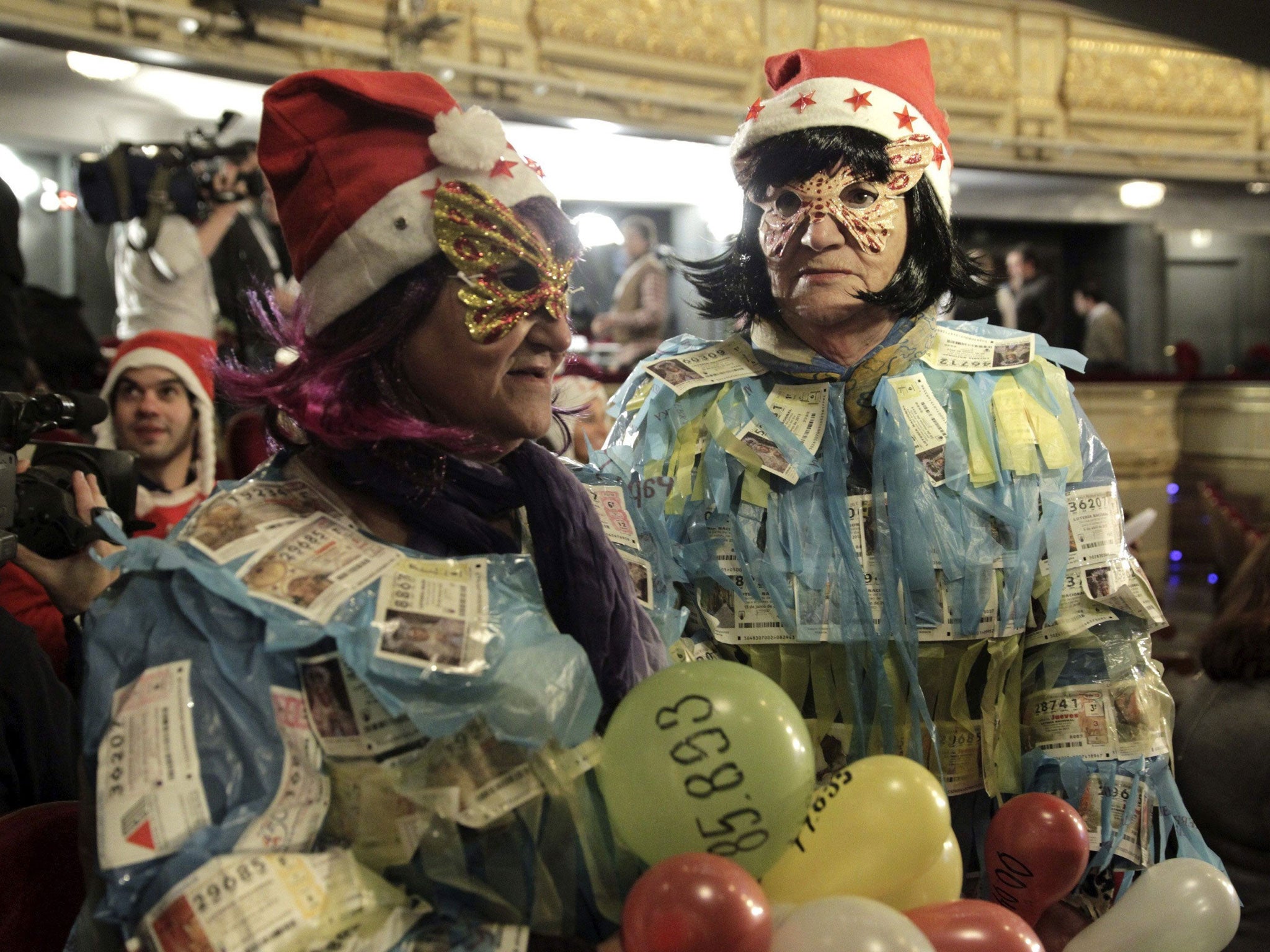Spain's El Gordo lottery: Fat chance or a ticket out of economic turmoil?
The world’s biggest lottery saw millions in the cash-strapped country hoping for a big win

Spain ground to a halt on Sunday morning as the nation’s attention focused on thousands of little white balls churning away inside two sizeable golden globes on a theatre stage in Madrid – producing the prizewinning numbers for the world’s biggest lottery, El Gordo (The Fat One).
More than three out of every four Spaniards had bought tickets for El Gordo this year.
The country’s total outlay on The Fat One may have dropped by 12 per cent since the recession first hit in 2007, but each punter nonetheless felt that the €2.2bn (£1.84bn) in total prize money was worth spending an average of over €60 on tickets.
As is traditional on every 22 December, too, many Spaniards spent Sunday glued to the television or radio from 9am sharp, hoping that they – if not the country – could fast-track out of Spain’s economic turmoil via one of the 180 first prizes of €4m on offer.
The price of a single El Gordo ticket has remained at €200 for several years, and a high percentage of punters have continued to opt for tenths of ticket shares at €20, returning €400,000 in the case of a first prize.
Even more buy yet smaller shares of El Gordo numbers from bars, local charities or shops – and the lifestyles of whole communities can change overnight when some of the bigger prizes are distributed – as often happens – within a single town, factory or area of a city.
On Sunday, as is traditional, Madrid’s Teatro Real theatre played host to the lottery prize draw, with one gold mesh ball around 2 metres in diameter on the left of a stage producing the winning numbers and a smaller ball on the right the number’s corresponding prizes.
As ever, too, for more than four hours children from the San Ildefonso orphanage half-sang, half-chanted out in dirge-like fashion the seemingly interminable series of winning combinations of numbers. These will then be reprinted in full on four-page special supplements in all of Spain’s daily newspapers today.
One of the biggest winners in Sunday’s lottery were the townsfolk of Mondragon in the Basque Country who collectively won €180m.
The financial manna could not have been more timely, given Mondragon’s main employer, the domestic appliances company Fagor, has recently filed for bankruptcy protection, with more than 2,000 job losses.
Most of the prize money went to the San Andres neighbourhood – the working-class area of Mondragon closest to the Fagor factory.
“It is a paradox,” Mondragon’s mayor, Inaxio Azkarraurizar, said. “San Andres was based on Fagor, the town has been a bit sad given what’s happened in the last few months, but this is good news.
“I hope it’s well distributed because there are a lot of people in financial difficulty,” he added.
Other recession-blighted towns joyfully cracking open the Christmas champagne early thanks to El Gordo on Sunday were Bailen, in north-east Andalusia – one of Spain’s biggest producers of building materials and which suffered badly when the country’s construction-fuelled economic boom collapsed – and Leganes, situated in Madrid’s industrial hinterland, which collectively received €350m.
While the mass celebrations in the streets of each lucky town form part of the annual El Gordo tradition, so, too, do the “sob stories” of those who end up kicking themselves for not having bought a ticket.
One such unfortunate is Greek immigrant Costis Mitsotakis, the only one of 250 villagers in Sodeto, north-eastern Spain, who did not receive a single cent when the town was collectively blessed with €120m in 2011.
According to the Spanish daily newspaper El Pais, Mr Mitsotakis missed out only because lottery sellers from a local housewives association decided his house was too far from the village centre to visit.
However, he has made the best of his bad luck and is currently producing a documentary, entitled Cuando Toco (When It Happened), about how life in Sodeto has been transformed by the El Gordo money – with one farmer forking out on a tractor worth around €100,000.
Other Spaniards are somewhat more pragmatic. “My father won €40,000 last year and he gave €4,000 to each of his [five] children, my mother got a new washing machine and he had some repairs done on the flat, but that was it,” Javier Caracuel, an unemployed man in his forties from the Andalusian town of Linares, told The Independent.
“Spaniards with a lot of money will maybe spend it on cruises, but for most of us who are in economic difficulties it pays off a chunk of the mortgage – as mine did.”
However, the winner of the biggest jackpot on Sunday was a complete newcomer to the El Gordo game – Spain’s inland revenue service.
For the first time, all prizes worth more than €2,500 were automatically taxed at 20 per cent of their value – further boosting the state’s initial profit on the lottery to a whopping €1.1bn.
Join our commenting forum
Join thought-provoking conversations, follow other Independent readers and see their replies
Comments
Bookmark popover
Removed from bookmarks